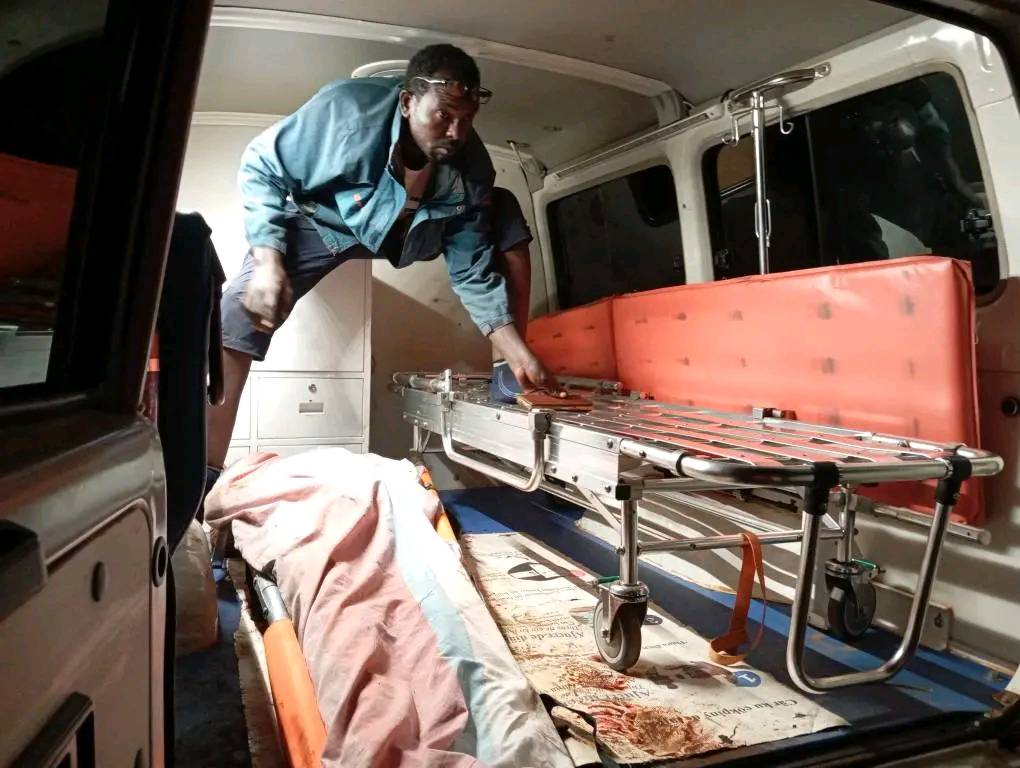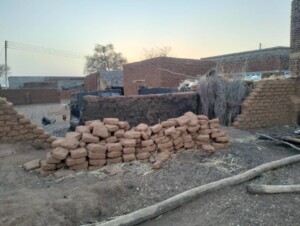Sudanese refugee murdered, scores wounded in knife attack in camp Kiryandongo, Uganda

An ambulance used to carry the wounded to Kiryandongo Hospital (Photo: Sudan Media Forum)
Prepared by Al-Taghyeer for Sudan Media Forum
On the evening of July 10, while trying to help his widowed neighbour and her children who were screaming for help, Sudanese refugee Kabashi Kafi came out of his home in Kiryandongo camp in Bunyoro subregion in western Uganda empty-handed, never returning. A social dispute between South Sudanese refugees and Sudanese refugees has developed into an assault with edged weapons, in a horrific incident that has once again raised the issue of security conditions in the camp.
Suffering and brutal killing
Painful details of the death of a Sudanese refugee and the suffering of dozens of fractures, serious injuries, severe bleeding and critical cases have been placed in intensive care, under harsh conditions living in the poor residents of the camp, who live in tents that they make themselves from plastic materials distributed to them (UNHCR), get water from distant wells, use small communal baths, and depend for their livelihood on relief and work to cultivate the land allocated to them to produce their needs.
Kabbashi, 40, was killed after being fatally struck with a hard object on his head and back, leaving a fractured skull that led to his death on the spot in front of his home. Medical reports said that the tool used in the attack weighed about 20 kilograms.
However, the incident was not isolated as it came as part of a series of systematic attacks carried out by hundreds of young men from the Nuer community against Sudanese refugees inside the camp, where they spread out in different locations using machetes, sticks, and knives. The attacks began at 7:30 p.m. on Thursday, July 10, targeting clusters B, C and D, and resulted in the injury of 19 refugees, some of them in critical condition, amid the near-total absence of police who arrived and then withdrew without much intervention.
Details of the tragedy
Speaking to Al-Change, Ammar Abdullah Kafi, a cousin of the deceased, recounted painful details about the night of the attack, saying that Kabashi was the father of two children: a seven-year-old girl and a nine-month-old baby. His family was on their way from the city of Renk to Juba and then Uganda but returned as soon as they received the news of his death.
Ammar explained that Kabashi arrived in Uganda in 2024, while he was delayed in Juba until February 2025, and the deceased continued to live with him until a month before the incident, when he moved to independent housing. He added, “The case of Kabbashi’s death is not a personal issue, this is an issue for all Sudanese refugees in Uganda, because everyone is threatened at any moment.”
He said that they worked in the clothing trade in Renk, then opened a shop selling goods in Juba, and after arriving at the camp, they worked on assembling beds, building “Karniks” and cleaning agricultural lands.
Regarding the moment of the attack, Ammar said that Kabashi went out in response to distress calls from neighbours, without carrying anything in his hand, and received a strong blow from behind with a hard object. He confirmed that the case was handed over after the burial to the head of the Sudanese Refugee Leadership Office in the camp, Hussein Timan, to follow up on the legal procedures, pointing out that the deceased had three sisters in Sudan, while his older brother, who lives in Waw, was unaware of the news of his death even weeks later due to the lack of a means of communication.
An ongoing tragedy
In an interview with Al-Change, the health official at the Sudanese Refugee Command Office in the camp, Sanusi Yousef Adam Makki, explained that the recent attacks have caused a great humanitarian tragedy whose effects are still ongoing physically and psychologically. He explained that the health office, in cooperation with volunteers, is working in difficult conditions amid a shortage of cadres and equipment.
According to him, the number of infected exceeded 20 during the first days and they were distributed to different hospitals: Kiryandongo, Gulu, Mulagu, and Lashore, while critical cases were taken to the capital, Kampala.
At Kiryandongo Hospital, Haroun Yahya, Mohamed Yousef, Abdulrazaq Ahmed, Mohamed Ibrahim, Taher Hassan, Abdulrahman Issa, Imaam Othman, Ibrahim Al-Douma, and Abdulrazak Abdulshafie are receiving treatment.
Those who have recovered: Shaker, Iman, Babakr Ishaq, Nada (from Dar Al-Shifa Hospital), and Attia (from Gulu Hospital). One case remains under follow-up at the Baniyadoli Health Centre, belonging to the injured Osman Mikael, and 11. injured people are still receiving treatment in different hospitals, some of them in intensive care rooms.
Critical cases and injuries
Youssef explained that the critical condition of Mr. “Ali” required an operation to save the liver, gallbladder, and diaphragm after penetrating stab wounds, and that “Rashid Mustafa” suffers from a brain haemorrhage, and “Mohamed Mursal” suffers from severe bleeding in the head and face.
He gave details of the wounded, which are 4 of the wounded in the second attack, all of whom suffer from severe injuries. The most serious case is that of the young Mubarak, who was severely injured in the head, and the examinations showed a laceration in the skull, a fracture in the left hand, partial paralysis in the right leg, in addition to a spear stab in the shoulder, bruises in the back, and multiple assaults near sensitive areas. He was transferred to Malago Hospital for advanced care.
As for Abdullah Suleiman, he was beaten on the head and eyes, and he was vomiting blood at first, and the bleeding stopped recently, but he has a weak response and cannot speak, and needs specialised care, while Youssef Mohammed suffers from a dislocated shoulder and strong blows to the eye and head, in addition to several injuries to the sticks.
Uniformed aggressors
Ibrahim Ali reported that the attackers were wearing a uniform consisting of white robes and black shirts. Ibrahim suffered a fracture in his left hand, back wounds, and head bruises, in addition to the marks of beatings with sticks on both sides of his body.
Fawzi Hassan, one of the wounded in the second attack, was transferred from Baniyadoli Hospital to Mulagu Hospital in Kampala after suffering a complex fracture in his thigh and knee and is currently receiving treatment and care there. A number of the wounded, whose cases did not require hospitalisation, continue to be treated at home with medical follow-up.
Trauma
The health official at the camp expressed his concern about the injured people suffering from chronic diseases such as diabetes and high blood pressure, although their health condition is moving in the direction of stability.
He stressed that their health team does not stop only at physical injuries, but also monitors cases of violent psychological trauma, especially among women and children. He especially mentioned the child “Masarat,” who became very panicked after seeing the death of the martyr Kabashi Kafi, and her psychological state is still deteriorating, and other women suffer from symptoms of constant anxiety and fear.
No medicine or anything. Just subtract to stop the bleeding
Fatima Ismail Adam, a Sudanese refugee and worker in the emergency branch of Kiryandongo camp, gave a painful testimony in her testimony to Al-Gorgon and said that the recent attack exposed the extent of the collapse of the health and security system in the camp. “The police withdrew minutes after arriving, leaving us to our fate,” she said.
The only police station in the camp has only 50 policemen, compared to more than 13,700 refugees, she said, making refugee communities self-protection points and volunteer ambulance teams.
Fatima Ismail revealed that the injured were transferred to the health centre inside the camp, which lacks medical staff and the most basic medicines, saying: “We found only one doctor in the face of 19 injuries, some of them critical. There were no medicines, no medical screens, no sedatives, not even stitching tools for wounds, we were dressing the wounds of the injured with sleeping covers, putting out the head and sheets.”
Cases of fractures of hands and legs have been documented among those injured, including an elderly man who suffered a double fracture of his leg and hands, and another who lost his sight in one eye as a result of severe beatings, and requires urgent surgery to remove the eye.
Earlier in mid-last year, the UN Refugee Agency (UNHCR) warned of the fragile security situation in the camp, noting that overcrowding, dwindling resources and poor health coverage are fuelling tensions and raising the risk of community-based violence.
This article, prepared by Al-Taghyeer, is published via the platforms of the Sudan Media Forum and its member institutions to shed light on the details of the events in Camp Kiryandongo in Uganda, which revealed the lack of security and protection of refugees in the camp amid the lack of health and basic services.

#SilenceKills #الصمت_يقتل #NoTimeToWasteForSudan #الوضع_في_السودان_لايحتمل_التأجيل #StandWithSudan #SudanMediaForum











 and then
and then